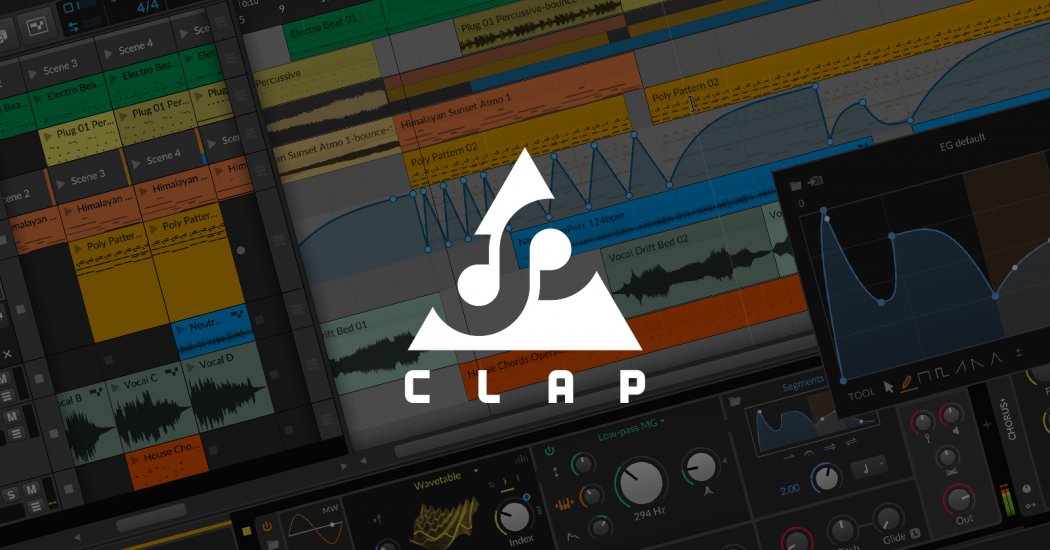
Developed in a joint venture between u-he and Bitwig, the CLAP (CLever Audio Plug-in) standard is designed to overcome the technical limitations of many of the industry’s older, more established audio plug-in formats. And since CLAP is easy to implement and is open-source, there aren’t many stumbling blocks that prevent DAW and plug-in developers from supporting and deploying it. In this article, we’ll explore the CLAP standard and include a list of manufacturers that currently support it.
CLAP: A Brief History
The CLAP standard began development in 2014 as a private project of Bitwig developer Alexandre Bique as he worked to port u-he plug-ins over to the Linux platform. After confronting problems and setbacks related to established plug-in standards, Bique developed a nascent version of CLAP, which he published on GitHub. The format then remained dormant for the next several years.
In 2021, u-he’s Urs Heckmann was searching for an open-source wrapper that would allow him to seamlessly convert one plug-in format to another. After he ran across the CLAP standard, Heckmann contacted Bique, which led to a joint venture between Bitwig and u-he. Within a year, there were more than 20 developers working on the CLAP project, with the core extensions publicly released in June of 2022.
What’s Cool About CLAP?
The CLAP format has been developed as a cutting-edge standard without the decades-long baggage that is holding back many legacy formats. As such, it is designed for today’s computers and caters to modern software and paradigms. So, what are the advantages of CLAP?
- CLAP is optimized for modern, multicore CPUs.
CLAP was developed specifically for modern computers. It boasts superior multi-thread management; it allows for collaborative multicore support between plug-ins and host software via what’s been dubbed a “thread pool.” CLAP also enables hosts to manage CPU threading for plug-ins that supply their own multicore support.
- CLAP offers lightning-fast metadata retrieval.
The CLAP standard is designed so that hosts can read plug-in metadata and also retrieve the metadata information before the plug-in even instantiates, which leads to faster plug-in scans.
- CLAP supports next-level automation, modulation, and expression.
The CLAP standard encourages new music creation methodologies using automation, modulation, and expression. CLAP supports per-note automation and modulation in accordance with MIDI 2.0 specifications. Its parameter modulation is nondestructive, so the target parameter will return to its original state when the modulation has finished. It also includes what some adherents refer to as MPE (MIDI Polyphonic Expression) on steroids, enabling polyphonic plug-ins to have their per-voice parameters modulated for individual notes.
- CLAP provides developer-friendly programming and licensing.
CLAP is an easy standard to implement for developers. The format has zero platform-specific dependencies, so it runs efficiently on a wide range of computers, as well as on embedded platforms and game consoles. And since CLAP is open-source, developers aren’t hampered by fees or cumbersome licensing agreements.
- CLAP‘s MIDI support is second to none.
With CLAP, plug-ins can send and receive any MIDI event on multiple ports. This future-proof format was designed to adapt to any MIDI standard, be it MIDI 2.0, MPE, or even a standard that hasn’t been invented yet. And, regardless of the MIDI standard, developers are free to decide how they want to apply it.
What Companies Support the CLAP Format?
Of course, it doesn’t matter how revolutionary CLAP is if nobody supports it. As of this writing, the most popular DAWs with CLAP support are Bitwig Studio and Cockos REAPER. That said, Avid, Image Line, and PreSonus have expressed interest in the format, so we may see it implemented in future versions of Pro Tools, FL Studio, and Studio One.
As far as plug-ins go, u-he, FabFilter, and TAL Software are the largest developers currently offering CLAP support, and Arturia and ValhallaDSP have expressed possible future support for the format.
Here is a full list of hosts and plug-in developers with current CLAP support:
Hosts That Support CLAP
- Anklang
- Bitwig Studio
- Cockos REAPER
- falkTX Carla
- MultitrackStudio
- MuTools MuLab
- Plogue Bidule
- Qtractor
- Sagan Technology Metro
- XT Software EXT64
- Zrythm
Plug-in Developers That Support CLAP
- Aida DSP
- Alex Nadzharov
- A.O.M.
- Applied Computer Music Technologies Ltd
- Arboreal Audio
- asb2m10
- Audio Damage
- Audiority
- AudioThing
- Bird’s
- BlauKraut Engineering
- Chowdhury DSP
- DISTRHO
- Doom Plugs
- DSP56300 Emulation
- ElephantDSP
- FabFilter
- Full Bucket Music
- GreyBoxAudio
- Hermann Brummer
- Impact Soundworks
- Joakim Frostegård
- Klaus Scheuermann
- LHI Audio
- Linux Studio Plugins
- Luciano Iammarino
- Martinic
- Michael Willis
- MiniMeters
- nakst
- NoFish
- pelennor DSP
- PolyChrome DSP
- Punk Labs
- Robbert van der Helm
- Sjoerd van Kreel
- Sonosaurus
- Surge Synth Team
- TAL Software
- The Usual Suspects
- TheWaveWarden
- u-he
- unplugred
- Uwyn
- VCV
- Vital Audio
- Vladyslav Voinov
- Wasted Audio
- Weird Constructor
- Wolf Plugins
- Zam Audio
CLAP’s Future Looks Bright
CLAP, in our humble opinion, is aptly named — it really is a clever plug-in standard. And it appears to be ready to take its place among established formats like VST, AU, and AAX. It will be exciting to watch events unfold as more developers offer support for this truly game-changing standard. Call your Sweetwater Sales Engineer at (800) 222-4700 if you have questions.
For further reading:


